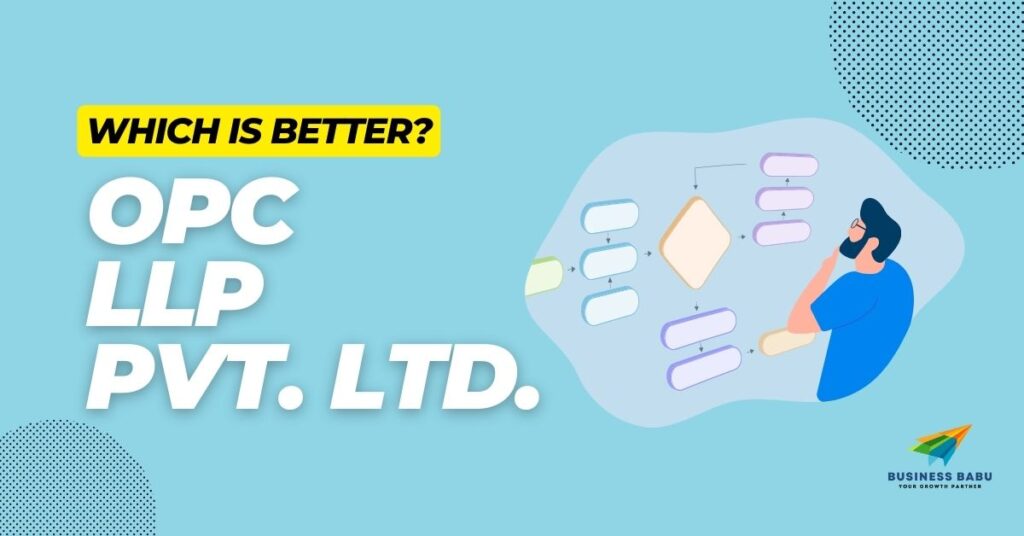
When it comes to starting a business in India, entrepreneurs have several options to choose from. Three popular business structures are the One Person Company (OPC), Limited Liability Partnership (LLP), and Private Limited Company. Each of these structures offers unique advantages and has specific compliance requirements.
In this blog post, we will explore the differences between OPC, LLP, and Private Limited Company in terms of their characteristics and compliance obligations.
I. One Person Company (OPC):
One Person Company is a relatively new concept introduced by the Companies Act, 2013. It allows a single individual to incorporate a company and enjoy the benefits of limited liability. Here are some key characteristics of OPC:
- Ownership: OPC can have only one shareholder, who is also the director of the company. Therefore, the individual has complete control over the decision-making process.
2. Limited Liability: OPC provides limited liability protection to the sole shareholder, meaning their personal assets are separate from the company’s liabilities.
3. Compliance Requirements:
a) Annual compliances include filing of financial statements, director’s report, and annual return with the Registrar of Companies (RoC).
b) OPCs must conduct an Annual General Meeting (AGM) within six months from the end of the financial year.
c) Appointment of an auditor is mandatory.
d) OPCs are not required to hold board meetings or maintain statutory registers.
II. Limited Liability Partnership (LLP):
LLP is a flexible and popular business structure suitable for small and medium-sized enterprises (SMEs). It combines the benefits of a partnership and limited liability of a company. Let’s explore its features:
- Ownership: LLP must have a minimum of two partners, and there is no upper limit on the number of partners. Partners can be individuals or corporate entities.
- Limited Liability: Similar to a private limited company, LLP offers limited liability protection to its partners, ensuring their personal assets are separate from the liabilities of the LLP.
- Compliance Requirements:
a) LLPs are required to file an annual return and a statement of accounts and solvency with the RoC.
b) Audit is mandatory only if the annual turnover exceeds a certain threshold.
c) LLPs must hold at least two partner meetings in a year, and minutes of the meetings must be maintained.
III. Private Limited Company:
A Private Limited Company is the most common and widely recognized business structure in India. It offers several advantages and is often chosen by startups and growing businesses. Let’s delve into its key features:
- Ownership: A minimum of two shareholders and two directors are required to incorporate a Private Limited Company. The shareholders can be individuals or corporate entities.
- Limited Liability: Like OPC and LLP, a Private Limited Company offers limited liability protection to its shareholders, separating their personal assets from the company’s liabilities.
- Compliance Requirements:
a) Annual compliances include filing of financial statements, director’s report, and annual return with the RoC.
b) Private Limited Companies must conduct an AGM within six months from the end of the financial year.
c) Audit is mandatory, regardless of turnover.
d) Regular board meetings and minutes of meetings must be maintained.
e) Statutory registers such as register of members, register of directors, etc., need to be maintained.
Comparative Analysis b/w OPC, LLP and Pvt. Ltd. Company
Here is a comparative sheet summarizing the differences between OPC, LLP, and Private Limited Company:
| Aspect | OPC | LLP | Private Limited Company |
|---|---|---|---|
| Minimum Number of Members | 1 | 2 | 2 |
| Maximum Number of Members | 1 | No limit | 200 |
| Liability | Limited | Limited | Limited |
| Annual Compliance Requirements | Yes | Yes | Yes |
| Mandatory Audit | No (unless threshold exceeded) | No (unless threshold exceeded) | Yes |
| Statutory Meetings | Not required | Partner meetings | Board and AGM |
| Director Requirements | 1 | 2 | 2 |
| Ownership and Control | Single individual | Partners | Shareholders and Directors |
Choosing the right business structure is crucial for the success and growth of your company. One Person Company (OPC), Limited Liability Partnership (LLP), and Private Limited Company offer different advantages and compliance requirements. While OPC suits individuals who want complete control, LLP is ideal for small enterprises seeking flexibility. Private Limited Companies are preferred by startups and businesses aiming for growth and fundraising.
It is recommended to consult with legal and financial professionals to understand the specific requirements and implications of each business structure. They can help you make an informed decision based on your business objectives and long-term goals. Remember, compliance with the regulations is vital to maintain the legal standing and credibility of your company.






